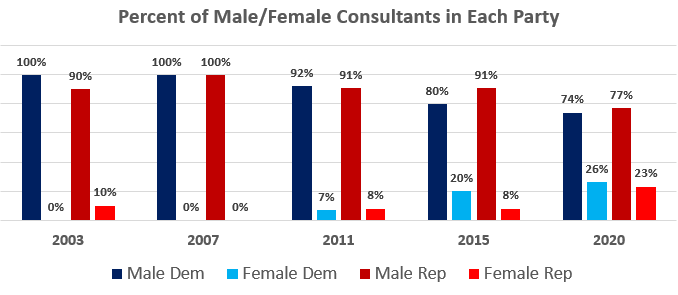Has the Trump Presidency and the popularity of President Donald Trump significantly changed the Republican Party? What level of ethical standards should campaign consultants be held to? How influential is social media in political campaigns? These are some of the questions I assessed from the perspective of political campaign consultants, who make decisions about how candidates can appeal to voters in primary and general elections.
For this year’s undergraduate research forum at MSU, I continued a working an Institute for Public Policy and Social Research (IPPSR) project that examined surveys of political campaign consultants. IPPSR has conducted several surveys amongst various media and general strategy campaign consultants since 2007, most recently 2020. These surveys asked questions about both the extent to which the consultants agreed with specific statements and the demographics of those consultants. Majority of the statements on the surveys cover elections, candidates, campaigns, consultant attitudes and demographics, and political parties. The statements ask about historical, current, and future perceptions to help understand how the consultants feel these topics have changed or will change over time. Through this research, I organized the responses to the questions to evaluate consultant views and compare the views of Republican and Republican consultants. In addition, I used comparisons to prior surveys to understand how campaigns have changed over time.
Results
Although the demographics questions about age and gender were some of the simplest, they yielded some of the most significant results. The gender demographics are important to highlight, because what I found was that the ratios of men to women consultants in both the Republican and Republican parties were significantly wide gaps. Each survey varied between about 30 and 50 respondents, and I believe no year exceeded more than 5 women respondents. It wasn’t until 2020 that the ratio finally started to get slightly smaller.

Some of the questions focused specifically on the consultants themselves. One that had an interesting difference in party responses was “What is your most important motivation for working as a political consultant?” The response options were interest, influence, and income. In both 2011 and 2015, the majority response from both parties was that their most important motivation was interest. Also in these two years, Republicans were more likely to choose income as their most important motivation than Democrats, who were more likely to choose influence. In 2020, this changed slightly, as the majority response for Republicans was interest while the majority response for Democrats was influence.
A question that got similar results between both parties in all years was “How often do you work for candidates in a different political party than your own?”. The response options were often, sometimes, seldom, and never. In all five years, the majority answer was never, with few responses choosing any of the other options.
Other questions focused specifically on campaigns. One asked “During the 2018/2012/etc. campaign, how often did you try to differentiate your candidate from President Trump/Obama/Bush”. The response options were often, sometimes, seldom, and never. Below are the results:
2007 (Bush)
- Dem Majority: Often (69%), Rep Majority: Seldom (53%)
2011 (Obama)
- Dem Majority: Never (46%), Rep Majority: Often (100%)
2015 (Obama)
- Dem Majority: Sometimes (50%), Rep Majority: Often (81%)
2020 (Trump)
- Dem Majority: Often (70%), Rep Majority: Sometimes (57%)
This question was interesting because since it had to do with whichever party was holding presidential office at the time, so the results varied significantly based on what year it was.
The survey has been modified over the years, so a there a few interesting questions that were only asked in the 2020 survey. They were both statements that the consultants were asked to agree or disagree with. The first was “Trump’s victory has transformed how Republican candidates campaign.” A majority of both parties disagreed with this statement, but Republicans were more likely (23% agree) to agree than Democrats (7% agree). The next statement was “Social media is becoming nearly as important as traditional media in political campaigns”. Once again, the majority of both parties disagreed with this statement and Republicans were more likely (27% agree) to agree than Democrats (18% agree).
Conclusions
After completing this research, there a few conclusions I came to. First, although Democrats and Republicans may hold different political views, they had very similar majority responses on a lot of the survey questions. The questions where opinions differed the most had to do with specific party characteristics, such as the question asking if they tried to differentiate their candidate from the current president. Next, 2020 was the year most distinct from all other years, implying that the more significant opinion differences are just now starting to occur compared to historical years like 2007. This could be because the two parties are becoming more polarized. Finally, I think that this survey should be continued considering we are living in a time where politics, campaigns, and elections are changing constantly. However, the distribution of the survey should be diversified, especially in terms of gender.
Natalie Del Vecchio is an Undergraduate Research Assistant at IPPSR. Her analysis, through the guidance of IPPSR Director Matt Grossmann, is a first-place winner at MSU’s 2021 University Undergraduate Research and Arts Forum. UURAF invites students from across campus to showcase their research. The 2021 Forum is the university's 23rd. Please see Del Vecchio’s presentation here.



